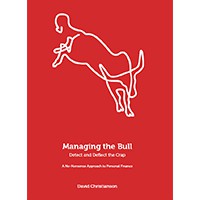Adopt a No-nonsense Approach to Personal Finance

Managing the Bull takes sophisticated (and common sense!) insider strategies and processes and makes them easy to understand. Detect and deflect the crap and take control of your finances today! Buy 3, Get 1 Free.
"A great no-nonsense approach to finance, investing, and looking out for our money. A lot of timely, well-research information wrapped in an entertaining read."
– Pat Foran, CTV's Consumer Reporter and author, The Smart, Savvy Young Consumer
SPECIAL OFFER – Buy 3, Get 1 Free
Books make a great gift for your clients! Select three books from our bookstore and receive your fourth book free. Order online* using PromoCode: KBRSPECIAL or call 1.866.953.4769 to place your order!
(* Online shopping cart will show $20 discount.)
Managing the Bull: Detect and Deflect the Crap
Successful investing is a long term undertaking, so it naturally takes patience. Patience is needed to stick with a plan for years or decades, until compound growth can really do its magic. As well, shorter-term patience is needed when the economic cycles or market corrections work against you, and temporarily make your strategy look wrong.
Courage may also be important. Often, courage is needed to buy equities when the markets are falling and the news is bad. The most successful investors are the ones who can buy equities or other fallen investments when there is “blood in the streets” and more timid investors are running for the exit.
Courage may also be needed when it’s time to sell some equities when the markets are very high and appear bound to rise higher, in order to re-balance a portfolio back to its target asset mix.
Successful investors are good at controlling their emotions of fear and greed, and preventing these emotions from pushing them off their long-term plan. Such investors may be intuitive, but they do not act prematurely on the impulses that emanate from high emotions.
The way that ALL investors can achieve such success is to put in place a framework that overrides emotion, and enforces patience and courage by replacing them with a systematic re-balancing strategy.
This is called the Investment Planning Process.
To be successful, an investor will:
1. follow the Investment Planning Process,
2. keep emotions (either positive or negative) from causing detours from the set strategy, and
3. stay out of the way while the investment plan and the chosen vehicles do their jobs.
Proper planning and time will lead to success.